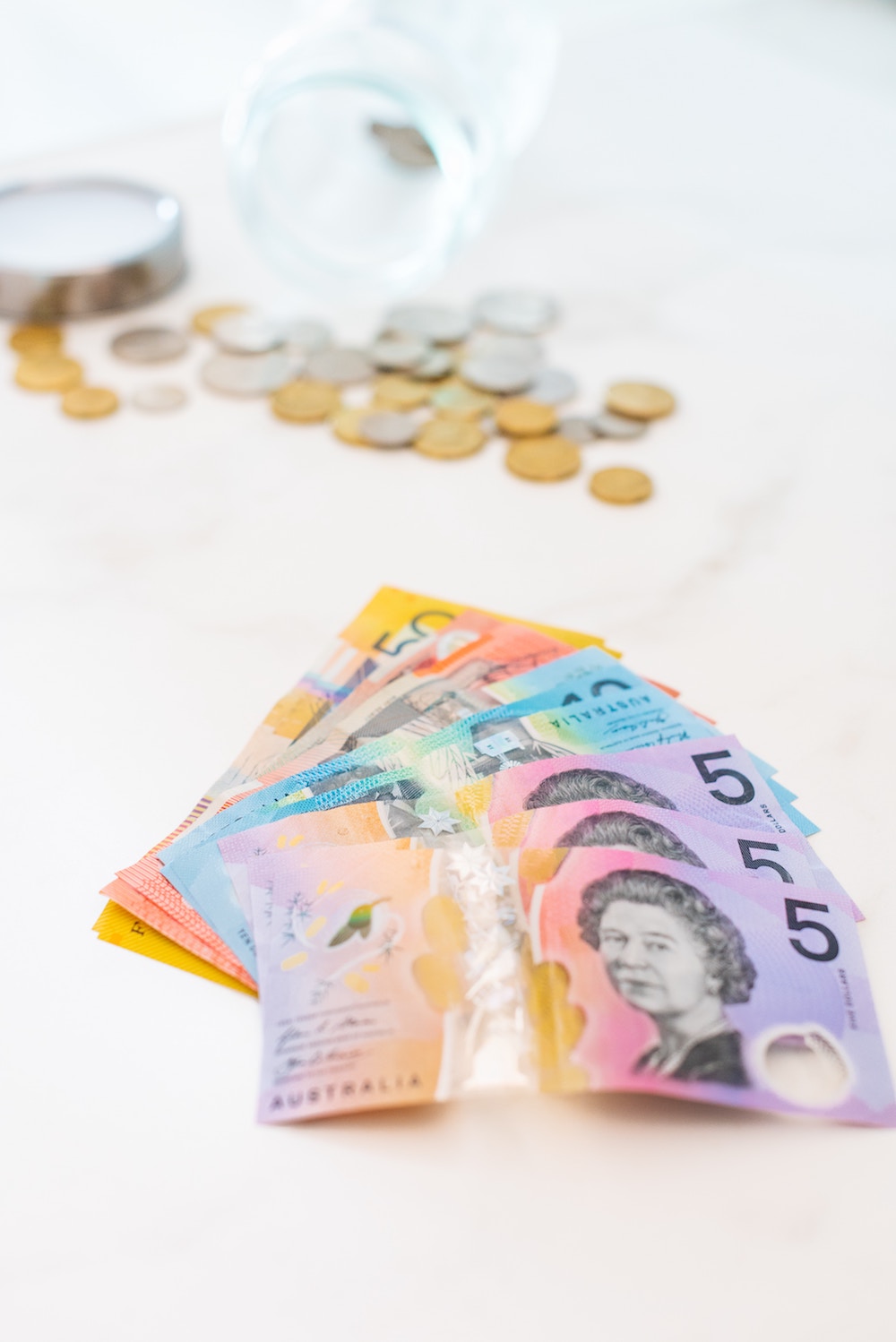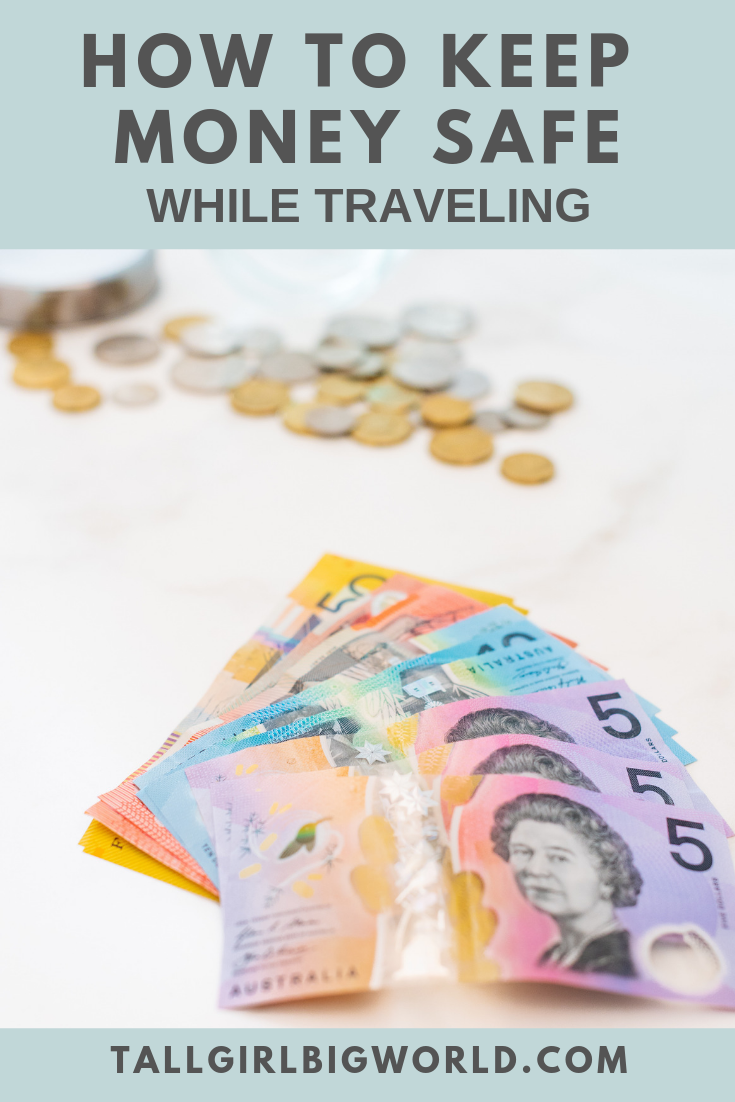Unsure what the best way to travel with money is? Here are my top tips on how to travel with money in a way that feels safe and secure.

One of the things I’m most careful about while traveling solo is keeping my money secure. Obviously, keeping your cash safe is important whether you’re traveling alone or with other people, but traveling by myself always makes me extra cautious with my money. When traveling solo, I know that if I lose my money or it gets stolen I won’t have a travel buddy around to help me out until I can get to an ATM. And if my credit card and cash gets stolen or misplaced, then I’m really screwed. Thankfully, I’ve never been in a situation where I couldn’t access my funds in some way, but I think that’s because my parents drilled into me from a young age how to keep money safe while traveling.
The first trip I ever took without my parents was to London with my theatre troupe the summer before my sophomore year of high school. I still remember my dad giving me an envelope with British pounds in it and telling me exactly how to store the money so that it’d be safe. My parents have never been worriers, but I could tell my dad was nervous that I’d either a) blow all my cash the first day and email him asking for more, or b) get mugged on the streets of London (despite the fact that he knew I’d be surrounded by 10 other students and four adults at any given time). I’m happy to report that I not only followed his instructions to a tee and kept my money safe, but I also returned home with cash to spare. (Thanks for the advice, dad!).
Since that trip to London, I’ve learned a few more lessons about protecting my money while abroad, including best practices to implement before I leave home. The following tips have served me well during my solo adventures, and I hope you benefit from this advice as well!
Before you travel:
Tell your bank you’ll be traveling
To ensure that you have access to your money at all times, it’s so important that you notify your bank that you’ll be leaving the country at least a week in advance. Your bank likely has both an online portal and an app, so it’s easier than ever to plug in your travel dates and notify them of your travels. If you don’t tell your bank you’ll be traveling, it’s likely to freeze your credit cards, thinking someone has stolen them. If this happens to you, you’ll have to call the bank and tell them there’s been a mistake (which will be tough to do if you’re traveling internationally and don’t have cell service).
Look up nearby money transfer places ahead of time
If your bank freezes your cards or you lose your cash, you’ll need to have money wired to you. Although this likely won’t happen to you, it’s worth looking up wire services in the area (places like Western Union). You might want to ask a friend or family member back home if they’re willing to wire you money, should the need arise. Again, it’s unlikely that you’ll wind up in this situation, but it never hurts to plan for these things!

While you’re traveling:
Keep backup cash in your hotel room
I always leave the bulk of my cash in my room and carry only the amount I think I’ll need that day. I also leave my debit card in my room, as it’d be far worse to have that stolen than my credit card (credit cards are easier to freeze, whereas someone with your debit card can easily access your checking account). If I notice I’m low on cash, I’ll bring my debit card for that one day so I can visit an ATM. Otherwise, it’s always in my room!
If a room safe is available, I’ll stash my money and spare card in that. If no safe is available (which is most common when staying in an AirBNB), I hide my cash in my suitcase and zip it up. Obviously, it’s not completely safe when stored this way, but it’s better than leaving money out in the open.
Keep your cash in an inner zipper pocket
It’s vital that you keep your wallet in an inner zipped compartment in either your bag or jacket. This will hopefully deter anyone from stealing your cash, since it’ll be harder to access without attracting your notice. Plus, keeping your wallet in a separate zipped compartment will prevent you from accidentally losing it while pulling out your camera, sunglasses, or anything else you have stashed in your bag.
Some travelers prefer keeping spare cash in a money belt or something similar, but I find that too much of a hassle. If I need to access that cash during the day, I can’t root around for it underneath my clothes — that looks a little weird, and that’s a great way to broadcast where my stash of money is hidden. I’ve always felt safe enough keeping my wallet in a zipper compartment in the inside of my backpack. Find what works for you, and stick to that money storage method each time you travel.
Carry smaller bills
If you have to stock up on foreign currency before you travel, ask the bank teller to give it to you in smaller bills (20s and under). This benefits you in a few ways; first and foremost, you don’t want to use a large bill to pay for a smaller meal or a souvenir. Again, that’s a fabulous way to advertise how much money you have on you and will potentially make you a target for pickpockets. Traveling with smaller bills also makes it easier to split up your cash and carry only what you need that day (which also helps me stick to a budget!).
Don’t count your cash in a public place
This seems like a pretty obvious tip, but I’ve seen so many tourists count their cash after a meal. Typically it’s moms or people in a group who do this, but you have to remember that traveling in a group doesn’t make counting your money in public any wiser of a decision. If you feel the urge to count your cash, I’m assuming it’s because you’re worried about sticking to a budget. If this is a concern for you, I recommend keeping a pen and a piece of paper to track your spending each day. Jot down how much cash you start with in the morning and subtract the amount you spend after each meal or purchase. The casual observer will have no idea what you’re writing down, and they probably won’t care.
Tell me: Have you ever been in a situation where you couldn’t access your money while traveling? If so, how did you handle that?
More posts you’ll love:
- 10 Easy Ways I Save Money While Traveling
- 10 Things to ALWAYS Pack in Your Carry-On
- 5 Useful Tips for Falling Asleep in an Unfamiliar Place
- How to Deal with Homesickness While Traveling


Leave A Reply!